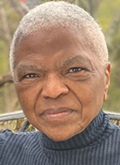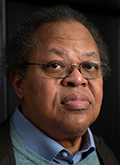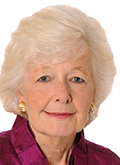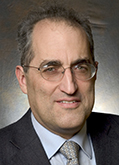Penn’s 2022 Commencement Speaker and Honorary Degree Recipients
Award-winning documentary filmmaker Ken Burns will be Penn’s Commencement Speaker at the 2022 University of Pennsylvania Commencement on Monday, May 16. He and seven other individuals will each receive an honorary degree from Penn.
Medha Narvekar, Penn’s Vice President and University Secretary, has announced the 2022 honorary degree recipients and the Commencement Speaker for the University of Pennsylvania. The Office of the University Secretary manages the honorary degree selection process and University Commencement.
The 266th Commencement begins at 10:15 a.m. on Monday, May 16 and will be preceded by student and academic processions through campus. The ceremony will feature the conferral of degrees, the awarding of honorary degrees, greetings by University officials and remarks by the Commencement Speaker. It will be streamed live on the Penn website. For University of Pennsylvania Commencement information, including historical information about the ceremony, academic regalia, prior speakers and honorary degree recipients, see www.upenn.edu/commencement.
Ken Burns
 Ken Burns has been making documentary films for more than 40 years. Since creating the Academy Award-nominated Brooklyn Bridge in 1981, Mr. Burns has gone on to direct and produce many documentaries, primarily focused on American history, culture, politics, and luminaries.
Ken Burns has been making documentary films for more than 40 years. Since creating the Academy Award-nominated Brooklyn Bridge in 1981, Mr. Burns has gone on to direct and produce many documentaries, primarily focused on American history, culture, politics, and luminaries.
His films have explored a long list of subjects, evidenced by a small sampling of titles: The National Parks: America’s Best Idea; The Roosevelts: An Intimate History; Jackie Robinson; The Vietnam War; Country Music; Cancer: The Emperor of All Maladies; and The Central Park Five. His latest effort, Benjamin Franklin, will premiere in April 2022.
Mr. Burns’s trilogy of epic documentaries began with The Civil War, a landmark television series for which he served as director, producer, co-writer, chief cinematographer, music director, and executive producer. It attracted an audience of 40 million during its premiere in September 1990.
Next came Baseball, which debuted on PBS over nine nights in September 1994. The film covers the history of baseball from the 1840s to the present, and through the extensive use of archival photographs and newsreel footage, depicts baseball as a mirror of our larger society.
Co-produced with Lynn Novick, Jazz rounded out the trilogy in 2001. This 19-hour, ten-part film explores in detail the culture, politics, and dreams that gave birth to jazz music, and follows this most American of art forms from its origins in blues and ragtime through swing, bebop, and fusion.
Mr. Burns’s films have been honored with dozens of major awards, including 16 Emmy Awards, two Grammy Awards, and two Oscar nominations. In September 2008, at the News & Documentary Emmy Awards, he was honored by the Academy of Television Arts & Sciences with a Lifetime Achievement Award.
A native of Brooklyn, New York, Mr. Burns graduated from Hampshire College in Amherst, Massachusetts, and went on to co-found Florentine Films.
Mr. Burns will be receiving an honorary Doctor of Arts.
Mary Frances Berry
 Mary Frances Berry is the Geraldine R. Segal Professor of American Social Thought, History, and Africana Studies emerita at the University of Pennsylvania, where she has taught since 1987. Dr. Berry teaches the History of American Law and the History of Law and Social Policy and advises students in African American History and Legal History.
Mary Frances Berry is the Geraldine R. Segal Professor of American Social Thought, History, and Africana Studies emerita at the University of Pennsylvania, where she has taught since 1987. Dr. Berry teaches the History of American Law and the History of Law and Social Policy and advises students in African American History and Legal History.
In addition to her work in academia, Dr. Berry has, since her college years, been politically active in the pursuit of civil rights, gender equality, and social justice and has received numerous honors for her activism. Among them, Dr. Berry was recognized with the 2021 Lewis Award for History and Social Justice by the American Historical Association. Named in memory of renowned civil rights leader and Georgia Congressman John Lewis, the award recognizes a historian for leadership and sustained engagement at the intersection of historical work, public culture, and social justice. In 2012, she received the Nelson Mandela Award from the South African government for her role in organizing the Free South Africa Movement in the U.S., which was instrumental in passing legislation to establish sanctions against trade with South Africa—an achievement that helped to end apartheid.
Dr. Berry has also had a distinguished career in public service. She was the Assistant Secretary for Education in the U.S. Department of Health, Education, and Welfare during the Carter administration and served on the U.S. Commission on Civil Rights under five presidential administrations, first as a member, and then as chair.
Dr. Berry is the author of 13 books whose subjects include the history of constitutional racism in America and the reasons behind the failure of the Equal Rights Amendment. Her latest book is History Teaches Us to Resist: How Progressive Movements Have Succeeded in Challenging Times (2018).
A native of Nashville, Tennessee, Dr. Berry earned a bachelor’s degree from Howard University and doctoral and law degrees from the University of Michigan.
Dr. Berry will be receiving an honorary Doctor of Humane Letters.
Atul Gawande
 A renowned surgeon, writer, and public health leader, Atul Gawande leads global health at the U.S. Agency for International Development. Prior to joining the Biden-Harris administration, he was a practicing general and endocrine surgeon at Brigham and Women’s Hospital and a professor at Harvard Medical School and the Harvard T.H. Chan School of Public Health.
A renowned surgeon, writer, and public health leader, Atul Gawande leads global health at the U.S. Agency for International Development. Prior to joining the Biden-Harris administration, he was a practicing general and endocrine surgeon at Brigham and Women’s Hospital and a professor at Harvard Medical School and the Harvard T.H. Chan School of Public Health.
Dr. Gawande’s research and leadership has long focused on developing systems innovations to transform safety and quality in healthcare. He was the founder and chair of Ariadne Labs, whose work includes testing implementation of a safe childbirth coaching and checklist intervention in India to improve neonatal and maternal outcomes; roll-out of a suite of systems tools that reduced the mortality of surgical care globally; and a randomized trial in collaboration with the Dana-Farber Cancer Institute to improve care and decision-making for patients at the end of life. He also co-founded and chaired Lifebox, a nonprofit organization aimed at making surgery safer globally, as well as CIC Health, which operates COVID-19 testing and vaccination nationally.
In addition, Dr. Gawande has been a staff writer for The New Yorker since 1998. He has written four New York Times best-selling books: Complications (2002), Better (2007), The Checklist Manifesto (2009), and Being Mortal (2014). He is the winner of two National Magazine Awards, AcademyHealth’s Impact Award for highest research impact on healthcare, a MacArthur Fellowship, and the Lewis Thomas Award for writing about science.
Named one of Boston’s best doctors by Boston magazine, Dr. Gawande received his medical degree from Harvard Medical School and a master’s in public health from the Harvard School of Public Health. Board certified in surgery, he completed his general surgery residency at Brigham and Women’s Hospital.
Dr. Gawande will be receiving an honorary Doctor of Sciences.
Amy Gutmann
 Amy Gutmann served as the eighth President of the University of Pennsylvania from 2004 to 2022. Named by Fortune magazine in 2018 as one of the “World’s 50 Greatest Leaders,” Dr. Gutmann is renowned for championing affordable access to education and healthcare, innovative discoveries that save lives and propel economies, global engagement, and public-private partnerships. She was confirmed as the United States Ambassador to Germany in February of 2022.
Amy Gutmann served as the eighth President of the University of Pennsylvania from 2004 to 2022. Named by Fortune magazine in 2018 as one of the “World’s 50 Greatest Leaders,” Dr. Gutmann is renowned for championing affordable access to education and healthcare, innovative discoveries that save lives and propel economies, global engagement, and public-private partnerships. She was confirmed as the United States Ambassador to Germany in February of 2022.
First in her family to graduate college, Dr. Gutmann made affordable educational access a priority, more than doubling the number of students from low-income and first-generation college families and making Penn the largest U.S. university offering all-grant financial aid that meets the full need of undergraduates.
As the leader of Philadelphia’s largest private employer, Dr. Gutmann oversaw the creation of a robust innovation ecosystem on Penn’s expanded campus, including the 23-acre Pennovation Works and its flagship Pennovation Center business incubator and laboratory.
A longtime advocate of collaborating across disciplines, Dr. Gutmann created the Penn Integrates Knowledge (PIK) University Professorships, which bring preeminent faculty to Penn from around the world. PIK University professors hold joint appointments in two or more of Penn’s 12 schools. With $1 billion in annual research funding and recognition as a global leader in immunotherapy and mRNA technology development, Penn has been consistently ranked as one of the most innovative universities in the world.
Dr. Gutmann is an award-winning author and editor of 17 books, including her most recent with Penn Integrates Knowledge Professor Jonathan Moreno, Everybody Wants to Go to Heaven But Nobody Wants to Die: Bioethics and the Transformation of Health Care in America. She chaired President Barack Obama’s Presidential Commission for the Study of Bioethical Issues from 2009 until 2017.
At Penn, Dr. Gutmann was the Christopher H. Browne Distinguished Professor of Political Science and a professor of communication. A graduate from Radcliffe College of Harvard University, she earned her master’s degree from the London School of Economics, and her doctorate from Harvard.
Dr. Gutmann will be receiving an honorary Doctor of Laws.
Carla D. Hayden
 Carla D. Hayden was sworn in as the 14th Librarian of Congress on September 14, 2016. Nominated to the position by President Barack Obama, she is the first woman and the first African American to lead the national library.
Carla D. Hayden was sworn in as the 14th Librarian of Congress on September 14, 2016. Nominated to the position by President Barack Obama, she is the first woman and the first African American to lead the national library.
Prior to the Library of Congress, Dr. Hayden served as Chief Executive Officer of the Enoch Pratt Free Library in Baltimore, Maryland, for 23 years. During her tenure, she led a revitalization of the historic library, prioritizing community access and technological innovations. Understanding the library’s significance to residents, she famously made sure its doors remained open during a period of civil unrest following the death of Freddie Gray.
Dr. Hayden began her career with the Chicago Public Library, serving as a library associate and children’s librarian from 1973 to 1979, and as the young adult services coordinator from 1979 to 1982. Dr. Hayden was the library services coordinator for the Museum of Science and Industry in Chicago from 1982 to 1987. She then moved to Pittsburgh to become assistant professor of library and information science at the University of Pittsburgh from 1987 to 1991. Prior to joining the Pratt Library, Dr. Hayden was deputy commissioner and chief librarian of the Chicago Public Library from 1991 to 1993.
In 2003, Dr. Hayden was elected president of the American Library Association. In 1995, she was the first African American to receive Library Journal’s Librarian of the Year Award in recognition of her outreach services at the Pratt Library, which included an after-school center for Baltimore teens offering homework assistance and college and career counseling. In January 2010, President Obama nominated her to be a member of the National Museum and Library Services Board and she was confirmed to that post by the Senate in June of the same year.
Dr. Hayden received a BA from Roosevelt University and an MA and PhD from the Graduate Library School of the University of Chicago.
Dr. Hayden will be receiving an honorary Doctor of Humane Letters.
George E. Lewis
 American composer, musicologist, and trombonist George E. Lewis is the Edwin H. Case Professor of American Music at Columbia University. After completing his undergraduate degree in philosophy at Yale University, he joined the Association for the Advancement of Creative Musicians (AACM), an African American collective now widely recognized for innovative American music.
American composer, musicologist, and trombonist George E. Lewis is the Edwin H. Case Professor of American Music at Columbia University. After completing his undergraduate degree in philosophy at Yale University, he joined the Association for the Advancement of Creative Musicians (AACM), an African American collective now widely recognized for innovative American music.
After 13 years at the University of California, San Diego, Professor Lewis joined Columbia’s department of music in 2004, serving as Area Chair in Composition and faculty member in Historical Musicology. Professor Lewis teaches courses in composition, computer music, and histories of 20th century music and experimentalism.
Professor Lewis’s music, including The Will To Adorn (2011), for sixteen instruments, Emergent (2014), for flute and spatialized audio processing, and the opera Afterword (2015), has been presented worldwide. He is also a pioneer in creating computer programs that draw on artificial intelligence techniques to improvise in concert with human musicians.
His scholarship explores technology, improvisation, race, and identity. His book, A Power Stronger Than Itself: The AACM and American Experimental Music (2008), received the American Book Award and the American Musicological Society’s first Music in American Culture Award. His articles include “Improvised Music After 1950: Afrological and Eurological Perspectives” (Black Music Research Journal, 1996); “Too Many Notes: Computers, Complexity and Culture in Voyager” (Leonardo Music Journal, 2000); and “The Situation of a Creole” (Twentieth Century Music, 2017). He co-edited (with Benjamin Piekut) the two-volume Oxford Handbook of Critical Improvisation Studies (2016), which presents perspectives from scholars working in both artistic and nominally non-artistic fields in the humanities, arts, and the social and natural sciences.
Professor Lewis has been elected to the Akademie der Künste Berlin, the American Academy of Arts and Sciences, and the American Academy of Arts and Letters, and he is a Corresponding Fellow of the British Academy. His other honors include a MacArthur Fellowship (2002), a Guggenheim Fellowship (2015), and a Doris Duke Artist Award (2019).
Professor Lewis will be receiving an honorary Doctor of Music.
Margaret H. Marshall
 Margaret H. Marshall is Senior Counsel at the Boston law firm Choate Hall & Stewart. Previously, beginning in 1999, she served as Chief Justice of the Supreme Judicial Court of Massachusetts, the first woman to be named to the position in its then 307-year history. She was appointed to the court as Associate Justice in 1996.
Margaret H. Marshall is Senior Counsel at the Boston law firm Choate Hall & Stewart. Previously, beginning in 1999, she served as Chief Justice of the Supreme Judicial Court of Massachusetts, the first woman to be named to the position in its then 307-year history. She was appointed to the court as Associate Justice in 1996.
During her tenure on the court, Chief Justice Marshall wrote many groundbreaking opinions, including Goodridge v. Department of Public Health (2003), which declared that the Massachusetts Constitution prohibits the state from denying same-sex couples’ access to civil marriage. The ruling made Massachusetts the first state in the United States to legalize gay marriage.
As Chief Justice, she was widely recognized as a champion for an independent judiciary and as a leader in the promotion of administrative reforms within the judicial branch. A long-time advocate of access to justice for all, she implemented innovative procedures for self-represented litigants and strengthened pro bono services by the bar.
Chief Justice Marshall was born in South Africa when apartheid, the oppressive system of white minority rule, was in place. While earning her baccalaureate from the University of the Witwatersrand in Johannesburg, she was elected President of the National Union of South African Students, at the time a leading anti-apartheid organization. She came to the U.S. to pursue a master’s degree at Harvard University and then received her J.D. from Yale Law School. Following graduation, Chief Justice Marshall practiced law in Boston, becoming a partner at Choate. Before joining the court, Chief Justice Marshall served as Vice President and General Counsel of Harvard University, the first woman to hold the position.
Chief Justice Marshall has been involved in numerous professional activities, including serving as President of the United States Conference of Chief Justices, and as Chair of the Board of the National Center for State Courts. In 2004, she became a Trustee of Yale University and until 2016 served as Senior Trustee, the first woman to do so.
Chief Justice Marshall will be receiving an honorary Doctor of Laws degree.
Edward Witten
 Edward Witten is a highly influential figure in theoretical physics and a leading expert on string theory, the best current candidate to unify all forces and matter, including gravity, by regarding elementary particles as vibrating one-dimensional “strings.” It attempts no less than to be the fundamental description of reality.
Edward Witten is a highly influential figure in theoretical physics and a leading expert on string theory, the best current candidate to unify all forces and matter, including gravity, by regarding elementary particles as vibrating one-dimensional “strings.” It attempts no less than to be the fundamental description of reality.
The Charles Simonyi Professor in the School of Natural Sciences at the Institute for Advanced Study (IAS), Dr. Witten conjectured in 1995 that the then-five competing notions of string theory could be unified under a single description. This hypothesis was widely influential and played a major role in what became known as the “second superstring revolution.’’
Dr. Witten has made significant contributions in many areas of physics, from cosmology to particle physics, with some applications to condensed matter physics as well. He is the most cited scientist in the physical sciences. With IAS physicist Nathan Seiberg, he solved an outstanding puzzle in the dynamics of gauge theories, which govern the behavior of matter within atomic nuclei.
Dr. Witten is also an important figure in pure mathematics, where his ideas about applying quantum physics to mathematical questions, from knots to geometry, have had a substantial impact. He is the sole physicist to have won the Fields Medal (1990), the premier prize in mathematics research. He has also garnered numerous other awards, including the Fundamental Physics Prize (2012), the Lorentz Medal (2010), the Isaac Newton Medal (2010), the Crafoord Prize (2008), the Henri Poincaré Prize (2006), and the National Medal of Science (2002).
A lifelong advocate for peace in the Middle East, Dr. Witten serves on the Board of Directors of Americans for Peace Now and on the Advisory Council of J Street. He holds a BA from Brandeis University and an MA and PhD from Princeton University.
Dr. Witten will be receiving an honorary Doctor of Sciences.
